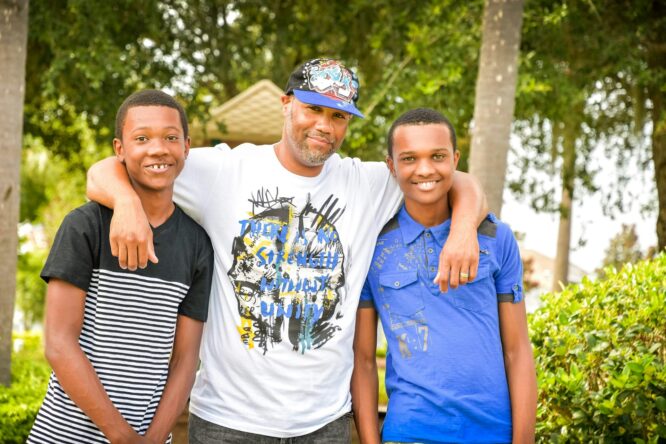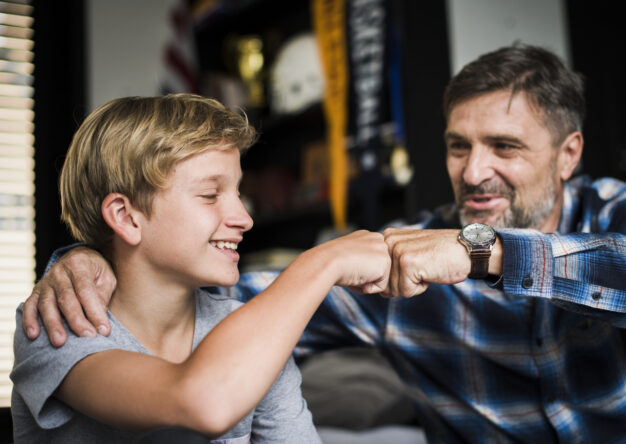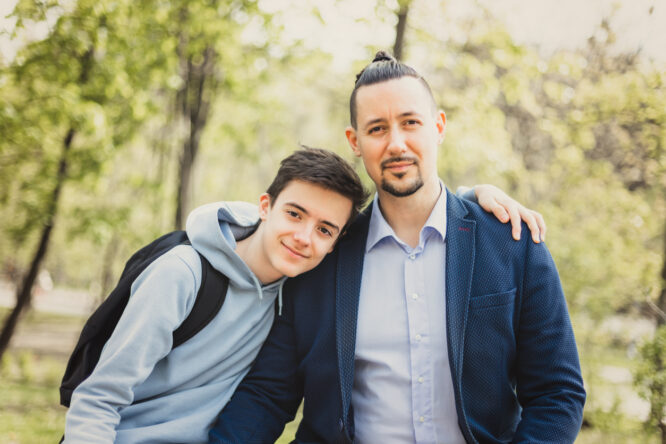Teenagers can be distant, sarcastic, and impossible to read, but that doesn’t mean they don’t care.

A father’s role during this time is more important than it gets credit for. The way he shows up, consistently or not, quietly shapes how teens see themselves, trust other people, and carry confidence into the world. That’s not to say that boys can’t grow up to be happy, healthy, empathetic men even without a dad in their life, but having that male role model can definitely impact them in major ways.
1. It sets the tone for how they expect to be treated.

Whether they admit it or not, teens take cues from their dads about what’s normal in a relationship, especially around respect, listening, and consistency. If their dad talks over them, never apologises, or isn’t around, that can stick in ways that show up years later.
On the other hand, when a dad makes space for their voice and actually listens without jumping in with criticism or solutions, it sets a different kind of standard. It shows them they’re worth hearing, and that’s not something they’ll forget.
2. Fathers can model what emotional control actually looks like.

Teens watch more than they listen. A dad who handles stress without lashing out or shutting down teaches a teen how to stay grounded when things are tense. They see firsthand how to deal with frustration without making it everyone else’s problem.
Even when mistakes happen, owning them without blame sends a stronger message than any lecture. Emotional control isn’t about bottling things up; it’s about showing your kid how to keep their cool without hurting people in the process.
3. Their dad’s presence influences their confidence more than he realises.

A teenager might roll their eyes at a compliment or act like they don’t care, but the truth is, they’re listening. Encouragement from a dad, when it’s genuine, lands deeper than it often gets credit for. Even small things like backing them up during a tough week or showing interest in what they’re good at can leave a mark. It’s not about making grand speeches. It’s about showing them, again and again, that they matter.
4. How a dad handles failure teaches them how to face their own.

If a dad treats failure like a catastrophe or shames his kid for messing up, the lesson becomes clear: don’t try unless you’re perfect. That mindset leads to anxiety, low risk-taking, and a fear of disappointing people. However, if a father responds with perspective and calm, even when consequences are involved—it shows teens how to take accountability without falling apart. That’s a skill they’ll need long after high school.
5. Consistency builds trust, even when they’re pushing you away.

Teenagers test limits. They’ll act cold, distant, or push back harder than you’d expect. However, what they’re often doing underneath all that is checking: Are you still going to show up? When a dad stays consistent—shows up, checks in, doesn’t take the mood swings personally—it builds a kind of quiet trust. They might not say thank you in the moment, but that steady presence doesn’t go unnoticed.
6. The way a dad treats their other parent shapes what they internalise about respect.

Whether it’s a partner, co-parent, or ex, teens are watching. How a dad handles disagreement, support, and responsibility in those dynamics sets an example for what they’ll expect or tolerate in their own relationships later. They pick up on tone, accountability, and how conflict is resolved. You don’t need to be perfect, but being respectful even during tension sends a strong message about what healthy communication actually looks like.
7. Teens notice whether their dad makes time, or just excuses.

Being busy isn’t the problem. It’s the pattern. Teens are smart enough to tell the difference between someone who genuinely has a full plate and someone who just isn’t prioritising them. You don’t need to be there 24/7. But small, regular efforts—watching a show together, asking about their day, remembering their schedule—show that you’re paying attention. That kind of investment matters more than any big one-off gesture.
8. Their dad’s reactions shape how safe it feels to open up.

If a teen gets met with judgment, teasing, or interrogation every time they try to share something real, they’ll stop trying. Dads don’t need to have all the answers, but how they react makes all the difference. Sometimes it’s as simple as not interrupting. Or listening without fixing. Or saying, “That makes sense,” instead of launching into advice. Those little moments of validation build a foundation they’ll return to when it really counts.
9. Fathers who admit when they’re wrong earn more respect, not less.

Trying to always be right doesn’t build authority—it builds distance. Teens can see when something doesn’t add up, and pretending you’ve got it all figured out usually just makes them shut down or roll their eyes. However, a dad who owns his missteps, apologises when needed, and keeps things real builds a more honest connection. It shows that respect goes both ways, and that being a grown-up means knowing how to repair—not just control.
10. Support from a dad can buffer against outside pressure.

Teenagers are dealing with pressure from school, peers, social media, and more. It’s relentless, and often overwhelming. A dad who provides support without piling on expectations can be a lifeline. That doesn’t mean lowering the bar. It means offering encouragement without tying it to performance. Just reminding them they’re more than their grades, mistakes, or popularity can go a long way toward building resilience.
11. How a father talks about mental health sets the tone.

If mental health is ignored, mocked, or treated like a weakness, teens learn to hide it. That’s how things fester. But if a dad talks openly about stress, therapy, or emotional struggles, even casually, it normalises asking for help. You don’t have to have all the right words. Just showing that emotions aren’t something to fear or be ashamed of can help them feel less alone in whatever they’re going through.
12. A dad’s encouragement carries weight, even if they don’t show it.

Teenagers might not react like they care. You’ll get shrugs, eye-rolls, or mumbled “yeahs.” But behind the scenes, a compliment from a dad, especially when it’s about effort or character, tends to stick. They might not say it now, but years later they’ll remember that time you said they handled something well or that you were proud. It’s the kind of confidence that builds slowly but stays for the long haul.
13. Teens want boundaries, even when they act like they don’t.

Pushing back on rules, curfews, or screen time is standard teen behaviour, but deep down, structure makes them feel safer. It tells them someone cares enough to pay attention, even when it’s annoying. Firm boundaries, explained clearly and enforced consistently, help them feel held—not controlled. And when it’s done with respect, they’re more likely to carry that same balance into how they treat themselves and other people.
14. How a dad shows up now shapes the adult relationship later.

The teenage years might feel like a slow drift away—but they’re also the years that quietly shape what comes next. How a dad handles this time will often determine how close they stay once the teen becomes an adult.
It’s not about being perfect. It’s about being present, honest, and real, even when it’s hard. That effort might not always be acknowledged in the moment, but it’s what makes space for the kind of adult bond that’s built on mutual respect, not just obligation.




